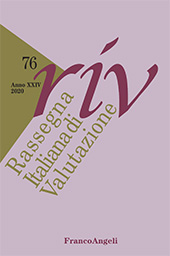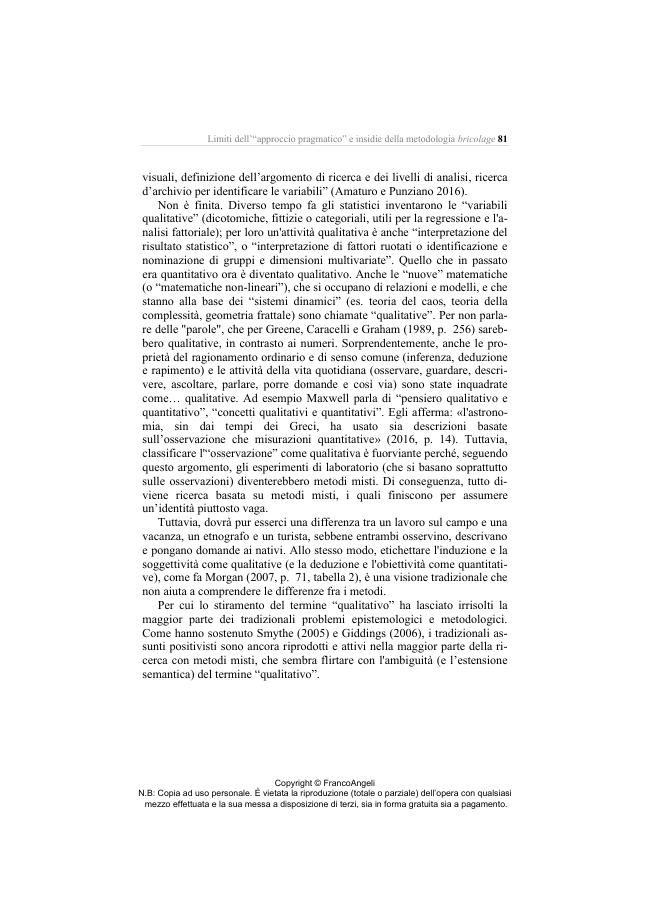2020 - Franco Angeli
Artículo
Digital Version
Download | Copia/pega | Impresión
Limiti dell'approccio pragmatico e insidie della metodologia bricolage : i metodi misti rischiano di riprodurre un'epistemologia positivista sotto mentite spoglie?
71-90 p.
- Mixed methods have often been presented as a third paradigm (Tashakkori e Teddlie, 2003; Morgan (2007), halfway between quantitative and qualitative ones. More recently, they have also been provided with a broader philosophical foundation identifiable in pragmatism, a philosophical program for social research, regardless of whether that research uses qualitative, quantitative or mixed methods (Morgan 2014, p. 1045), proposed as a "third way" between positivism and constructivism (Maxcy 2003, Johnson and Onwuegbuzie 2004, Morgan 2007 and 2014, Biesta 2010, Tashakkori and Teddlie 2010, Pearce 2012, Hall 2013). This (apparent) novelty has also made it attractive in evaluative research.
- However, are contemporary mixed methods (and the related pragmatist approach) really a third way? For example, in their empirical inquiries, will mixed method and pragmatic researchers use a classic (and positivistic) questionnaire with forced choices and closeended answers, which are a strong limitation to an interpretative and interactional perspective? Recalling that those conventional fixed formats are responsible for many wellknown response errors and biases? Have the concepts of 'measures' and 'measurement' (and their positivistic imprinting and use), become so widespread in mixed method literature, been rethought within a pragmatic approach or only imported, underestimating several epistemological, methodological and technical problems related to measurement?.
- While analyzing in detail the foundations of this approach, a number of theoretical and methodological difficulties of the pragmatist proposal seem to emerge precisely on the level of .. research practices. Hence, although the pragmatic approach is proposed as a paradigm for the dissolution of differences and the neutralization of epistemological barriers, in practice it runs the risk of ending up reproducing the positivist paradigm in disguise, by not problematizing and reforming current research methods. The evaluator should take this into account. [Publisher's text].
Forma parte de
RIV : rassegna italiana di valutazione : 76, 1, 2020-
Información
Código DOI: 10.3280/RIV2020-076005
ISSN: 1972-5027
KEYWORDS
- Mixed methods, merged methods, measurement, epistemology, methodology, positivism
-
En el mismo archivo
- L'importanza dei mixed methods nella ricerca valutativa, le ragioni di un numero monografico
- Research and evaluation : the practices, politics, and possibilities of Mixed methods social inquiry
- Usi e utilità dei Mixed methods nella ricerca valutativa
- Mixed methods e valutazione democratica
- Limiti dell'approccio pragmatico e insidie della metodologia bricolage : i metodi misti rischiano di riprodurre un'epistemologia positivista sotto mentite spoglie?
- Verso l'adesione alla ricerca mixed methods nella valutazione dell'istruzione? : alcune indicazioni dall'Istituto Nazionale di Valutazione del Sistema di Istruzione (INVALSI)
- I mixed methods e la valutazione : un'analisi tramite Structural topic model



